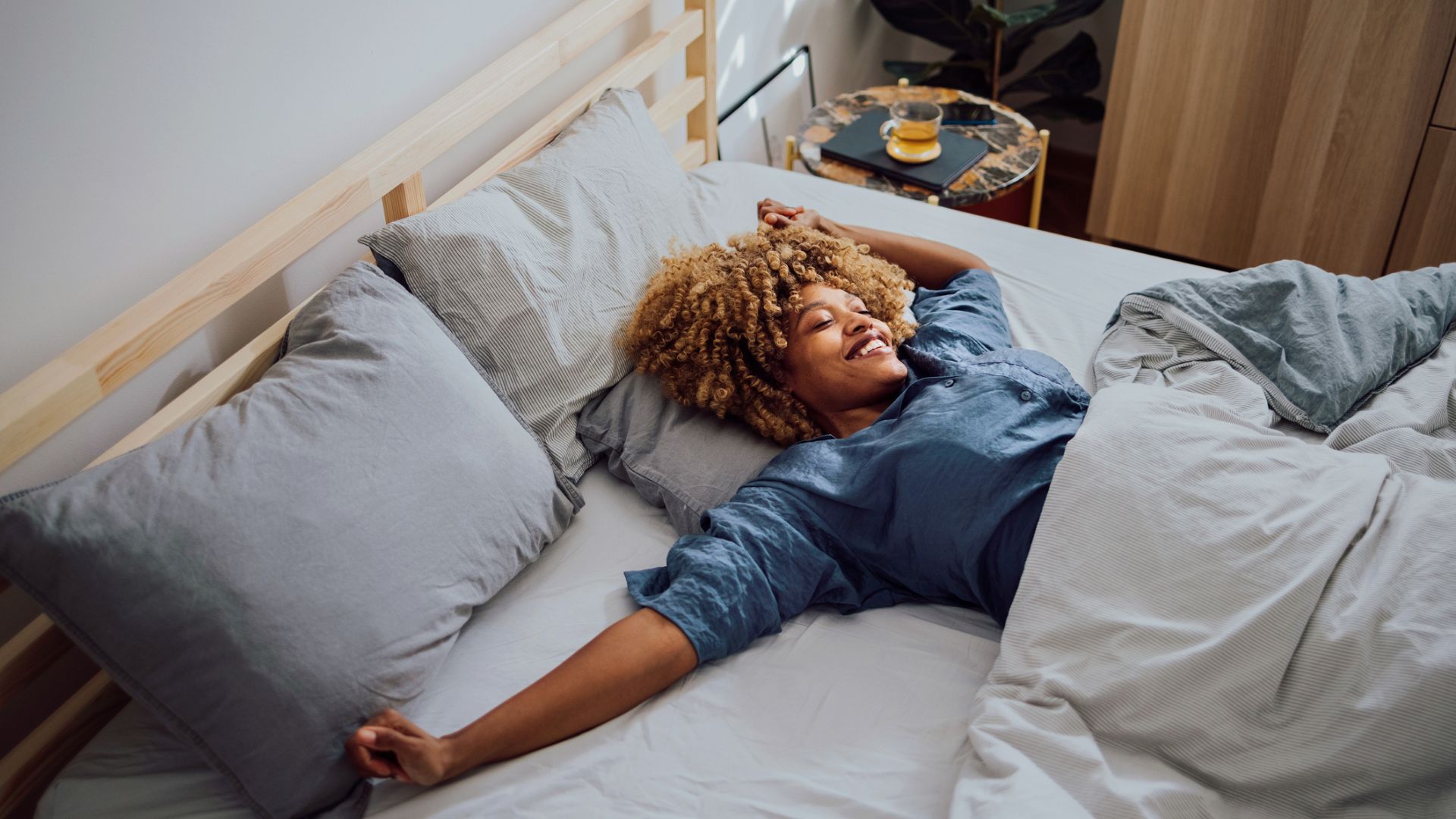
Are you losing sleep due to your partner's snoring, restless tossing and turning or a mismatched sleep schedule? If you're nodding along, welcome to the club! A sleep divorce rewrote my love story: separate beds, a shared future and the sweet sound of nighttime silence.
That's not to say I wasn't apprehensive to tell my friends that my partner and I slept separately at first though. Sharing a bed with a partner is seen as a fundamental part of being in a relationship. I thought people might judge us or jump to the conclusion that we were no longer in love. But it was the opposite - we loved each other so much that we would do anything to ensure our relationship flourished. For us, that meant getting a good night’s sleep in separate rooms.
We're not the only ones to conclude that sleeping separately can lead to better sleep and improved sleep hygiene overall. A recent sleep divorce survey by the American Academy of Sleep Medicine (AASM) reveals that more than a third of people sometimes or regularly sleep in a separate room to accommodate their sleeping partner. While in the UK, a YouGov Sleep Study online poll discovered that 37% of adults sleep better alone.
Nowadays, I’ll proclaim the benefits of sleep divorce with pride to anyone who’ll listen. And guess what? Many of my friends have admitted they’re envious. They would love a retreat and be able to sprawl out like a star in bed purely because they can. And most of all, to enjoy an uninterrupted, peaceful sleep every night.
What is a sleep divorce?
A sleep divorce simply means that you and your partner choose to sleep in separate beds or even separate bedrooms. It has dramatic connotations but the practice aims to help improve a relationship and enhance sleep quality, rather than separate couples.
Like me, many people choose sleep divorce to help combat sleep problems. "Differing sleep habits, timings, comfort needs, and work schedules all have the potential to disturb sleep quality," says Dr Guy Meadows, co-founder and clinical lead of Sleep School. "Similarly, sleep disorders such as snoring, sleep apnea, insomnia and restless leg syndrome can result in one or both partners waking up unrefreshed. Physical health issues such as chronic pain, acid reflux, and menopause can also be a problem, as can mental health issues such as anxiety and depression."
My sleep divorce story
My partner and I have been together since 2007 and we have slept in separate rooms since 2012. I do not doubt that we wouldn't be together now if we hadn't had a sleep divorce.
He’s a heavy sleeper, while my fitness tracker reveals that I consistently spend more time in ‘light sleep’ than any other sleep stage.
I struggle to recall a single night of restful sleep from the first five years of our relationship. There were quiet intervals each night when I'd manage to drift off, only to be jarred awake by his intermittent snoring. No amount of nudging or position change prompts could curb it. I'd lie in bed night after night, staring at the ceiling, incensed. And I’m ashamed to admit I started to resent him sleeping soundly when I could barely sleep at all.
I scoured the internet for snoring advice and I tried everything from white noise apps and snore-cancelling earplugs for me to anti-snore pillows and nasal strips for him. None of these worked for us.
To make matters worse, his morning routine started with the first alarm going off at 5.50 am. He’d hit ‘snooze’ several times until he got up at 6.15 am. I was wide awake with the first alarm but didn't need to be awake until 6.50 am. With gritted teeth, I’d silently rant that I wouldn't be awake right now if I were sleeping alone.
Our second son was born in December 2012. I was already sleep-deprived from the night feeds, but to return to bed and struggle to get back to sleep because of my partner’s snoring was too much to bear. I felt I was losing my mind. So I asked my partner to try sleeping in the spare room. I gently explained it was simply to allow me to catch up on some solid sleep and was in no way any reflection on our relationship. He understood and agreed.
After just three days of starting our sleep divorce, we restored harmony in our relationship. We still took turns feeding our baby throughout the night but returning to our separate bedrooms allowed us both to sleep so much more soundly. I would fall back to sleep quickly and easily. And my partner wasn’t being repeatedly prodded and made to turn over. It was a win-win!
We were both more rational during the daytime and we started to enjoy each other’s company again. I felt happy, I was able to concentrate once more and had so much more energy to enjoy my family.
This is a common experience among those who choose to sleep apart in a relationship, says Dr Meadows. "If sleeping in separate bedrooms means that you’re able to achieve better quality sleep regularly, then in the short term you can expect to start feeling more refreshed and energised, experience better mental focus and motivation and feel happier and more emotionally balanced."

What are the benefits of sleep divorce?
The benefits of sleep divorce are linked to the benefits of better sleep, rather strictly related to sleeping away from a partner. Good sleep can help boost the immune system, reduce blood pressure, help with weight management and help to improve your mental health. In my experience, waking up in a better mood has completely turned my life around.
But if these benefits and waking up feeling refreshed and energised with better mental focus, improved motivation, and a happier, more balanced feeling in daily life isn't enough reason to try a sleep divorce, there are other benefits too. Here are the other major benefits of sleep divorce, according to Dr Meadows:
1. Better relationships
"Poor sleepers are four times more likely to have relationship issues," says Dr Meadows. "Possible reasons for this include the fact that poor sleep is reported to make you less engaged and appreciative of your partner the next day, as well as causing you to view the facial expressions and tone of voice of others more negatively."
In contrast, "good quality sleep helps to emotionally reset us, enabling us to wake up happier and have a more positive outlook on the world and those around us, something that can only be good for our relationships."
2. A sleep divorce can help with weight management
When it comes to losing weight healthily, hunger hormones ghrelin and leptin play a vital role. As research from the UV University Medical Centre explains, ghrelin is made in the stomach and sends hunger signals to the brain. Leptin, which is made in the fat cells, sends a signal to the brain when we're full. When we're deprived of sleep, ghrelin levels rise while leptin levels lower in the blood.
However, getting between seven to nine hours of sleep a night keeps the natural production of these hormones in order, making it easier to lose weight as and when we want to.
Sleep can also protect us against weight-related diseases, Dr Meadows says. "Sleep can safeguard you against preventable weight gain, obesity and diabetes, as poor sleep has been linked to an increased urge to overeat (thanks to rising levels of ghrelin)," he confirms. "A lack of sleep also sees a decreased sensitivity to insulin and a higher risk of developing type 2 diabetes."
3. Boosted immunity
Likewise, getting enough good quality sleep can help ward off colds and flu and keep the immune system working properly.
"Researchers have shown that getting between seven to eight hours of sleep a night enhances the function of T-cells, a type of white blood cell which attacks and kills pathogens i.e. viruses, bacteria and other microorganisms that can cause disease,” says Dr Meadows.
How to talk to your partner about sleep divorce
Despite all its benefits, speaking to your partner about sleep divorce can be daunting. When asking my husband for a sleep divorce, I explained the concept gently and was keen to reinforce that it was to allow me to catch up on some much-needed sleep, rather than a symptom of any relationship issues.
If you want to talk to your partner about a sleep divorce, you may feel worried about hurting their feelings or potential misunderstandings. How do you even start?
“If you're introducing the subject be careful not to blame and to frame sleep divorce as in the interests of the relationship," says Cate Campbell, a British Association for Counselling and Psychotherapy (BACP) accredited therapist who specialises in sex, relationships and trauma.
Campbell suggests not using the words 'sleep divorce' at all, as this can make it sound negative. Instead, she encourages couples to talk about establishing a 'better sleep plan'. This already makes it sound better, showing just how a change in words can shape how we feel.
Many people worry about sleep divorce hindering intimacy in a relationship. Our trial sleep divorce worked so well for my partner and me. There's been no going back since. We’ve found a new emotional and (perhaps even better) sexual connection as we have ‘date night’ every Saturday night, which is most often a fabulous meal at home. The anticipation of inviting my partner to my room afterwards makes each date feel like a special occasion.
Cambell emphasises coupling any new sleeping arrangement, whether it be a sleep divorce or the Scandinavian sleep method, with a daily intimacy routine. "'[This includes] hugs and kisses whenever you leave or rejoin each other and before bed each night. Some couples spend time chatting or cuddling in bed together before they go their separate ways each night. Opportunities for intimacy include cuddling up on the sofa to watch TV and bathing or showering together.”







